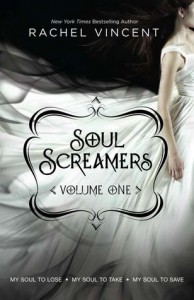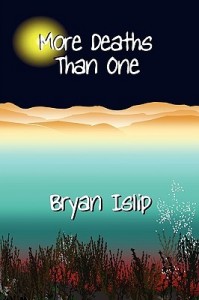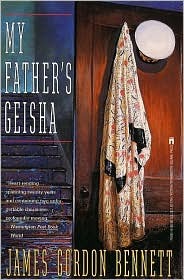
About a year ago, I won a copy of Rachel Vincent’s Soul Screamers (Volume One) from BooksandBlossoms.com.
Description from Goodreads:
My Soul to Lose
Kaylee is just your average girl shopping at the mall with friends—until a terrified scream bursts from her that cannot be stopped. Taken to a hospital ward, will she be able to save her mind—and her life?
My Soul to Take
She’s always felt different, but now Kaylee discovers why. The screams that cannot be denied mean that someone near her will die—and she can never save them. Because saving one life means taking another
.
My Soul to Save
Going on dates with her boyfriend is still new to Kaylee. But when the singer of the band they’re seeing dies onstage and Kaylee doesn’t scream, she knows something crazy is going on. Soon she discovers souls can indeed be sold
.
I’ll round up to 4 stars. I gave the prequel a 3 because it was well written and interesting, but almost nothing on it’s own. I gave the first book a 4. I enjoyed it. But dropped a star form book 2 because there was so much recap and info-dumping. It’s probably easiest to just post the three reviews.
Reviews:
I don’t usually cite star ratings on this blog as I think they often muddle the review. It’s too easy to just glance at the number and gloss over the written review. But for this omnibus, I think it’ll be easier if I reference them.
I’ll round up to 4 stars for the volume as a whole. I gave the prequel a three because it was well-written and interesting, but almost nothing on its own. I gave the first book a 4. I enjoyed it. But dropped a star from book two because there was so much recap and info-dumping. Here are my thoughts on the individual works.
My Soul to Lose
An interesting start to the series. My interest is piqued, and I’m curious to see how it progresses, but on its own, it feels incomplete. Nothing is resolved. More questions are presented than answers provided. In fact, almost nothing is concluded. I’d call it a prologue to something else, as opposed to a book (or even a story) on its own. [Plus, having finished books one and two, now I can officially say that nothing in it is touched on again. The girl who helps Kaylee never shows up again. That feels like a missed opportunity right there.]
My Soul to Take
I liked it alright. Kaylee was a good, strong heroine. Nash was wonderfully supportive. There were a few good twists. I generally liked most of the characters and it was well written.
The book did have a few irritants, though. For one, Kaylee was nowhere near angry enough with her family for lying to her her whole life. Nowhere near angry enough! I felt cheated by her lack of venom. Plus, I still don’t understand why they did it. I understand why her father sent her to live with his brother, but why wasn’t she told about her heritage? That was never addressed. For another, Nash seemed to have fallen instantly in love with Kaylee. I generally hate insta-love, but that wasn’t what this felt like. I don’t want to give any spoilers, so I’ll be vague. But, other than their parents, they were the only two of what they were, and it felt very much like this was the basis of his infatuation.
Yet another irritant was the fact that even amidst all the new, mind-boggling information Kaylee was assimilating, we are somehow supposed to believe that she alone noticed the mystery in need of solving. Then, despite the fact that her theory was practically based on fairy dust (i.e., nothing substantial), she was right. I thought the very fact that she knew something was wrong felt almost miraculous.
Lastly, there seemed to be a little bit of a plot hole between the fact that those who claimed the souls of the departed were doing a job they were recruited for, while Kaylee and Nash had a natural-born skill. These two tasks seem to be connected, flip sides of a coin almost. So how is one something you are born to do and the next something you are essentially hired to do? It seems to me that both would either have been natural or not, but how can they be so closely related if they haven’t evolved together?
All-in-all, I enjoyed the read. I have the next in the series, My Soul to Save, and I’ll be reading it next.
My Soul to Save
I’m still enjoying this series. Kaylee is still a wonderfully strong heroine who depends on her boyfriend a lot but isn’t dependent on him. (If that makes any sense.) I like that. I also really like Tod. He’s an interesting character who often brings about thought-provoking moral quandaries. I like that, too, and the fact that Kaylee (who is usually the decision-maker) doesn’t always do the ‘right’ thing. It makes for an interesting read. I also just plain like the narrative style. Plus, the unmistakable similarities between the evil empire (Dekker Inc.) and Disney were golden. Golden I say!
Like the first book, however, there are a few aspects of the story that leave me scratching my head. Again Kaylee managed to take some small snippet of information, almost nothing really, and weave a theory around it. Then, miraculously succeed with it. This time, based on one overheard sentence, she needed to find one demon of a specific sort, of which there could be many. The first ‘person’ she asks is able to tell her where he is; he’s the right one; they find him immediately and are able just to walk right in and see him. Not to suggest that there were no difficulties, but it all seemed to go a little too easily.
Then there is the basic question of why exactly Kaylee feels like she and she alone has to save everyone. It never seems to occur to her to ask for help. I also had a little trouble grasping the whole drama around being grounded. I probably would have been able to relate to this if I was younger; I admit. But it seemed to me (and Tod, apparently) that normal teen drama issues would just get blown off in the face of saving souls and all. On a similar note, she seems to accept her father’s reappearance and overzealous parenting with ease. Her internal thoughts were often appropriately acerbic, but she never vocalized them. Maybe I’m just mean, but I think after 13 years he deserved a little guilt. I kept waiting for her to lay into him finally and she had plenty of opportunity. But she never did.
My main complaint about this particular book, however, was that the first half was really cluttered with info-dumps and recaps of book one. For a little while, it felt like every paragraph had some sort of catch-up clause in it, and it really broke up the narrative. I got pretty frustrated with it after a while.
The bottom line, though, is that I basically enjoyed it. If I come across book three at some point, I’d be more than happy to give it a read.
 I won a copy of Bryan Islip‘s More Deaths Than One through Goodreads’ Firstreads program and I should start by apologising to the author for taking a full year to get around to reading it. I have excuses, but I figure they’re probably pretty irrelevant to anyone but me.
I won a copy of Bryan Islip‘s More Deaths Than One through Goodreads’ Firstreads program and I should start by apologising to the author for taking a full year to get around to reading it. I have excuses, but I figure they’re probably pretty irrelevant to anyone but me.

